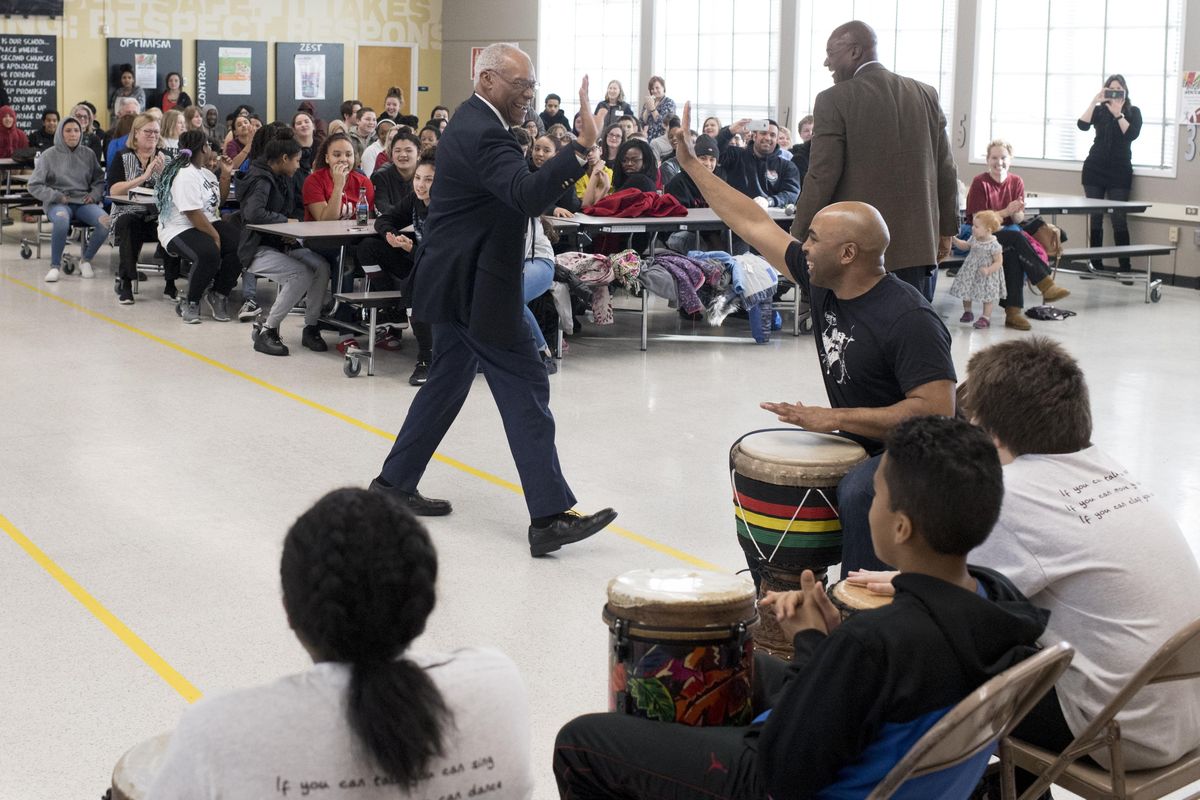Former U.S. ambassador brings message of hope to Shaw Middle School

At 79, Delano Lewis displayed the moves Monday of a man several years his junior as he danced to drums provided by the Cooper Drummers & Dancers at an assembly held in his honor at Shaw Middle School.
Besides his impressive footwork, the former U.S. ambassador to South Africa spoke at Shaw as part of Black History Month. The former Justice Department lawyer and head of National Public Radio told the students that the key to making the world a better place resides in their own hearts.
“Family is important and community is important,” Lewis told the students, “but you have to start thinking about yourself.”
Former President Bill Clinton appointed Lewis as ambassador to South Africa in 1999 just as the presidency was ending for the late Nelson Mandela. Before becoming president, Mandela served 27 years in prison for battling apartheid, the system of racial segragation and discrimination that persisted between 1948 and 1991.
“I’m telling you,” Lewis told the students, “you too can be that. You, too, can do that. It all starts with you.”
Lewis spoke last week at Garfield High School in Seattle in an auditorium named after his close friend, music icon Quincy Jones. Lewis was invited to speak Monday at Shaw Middle School by Cynthia Clauson, a former school administrator who is now a teacher on special assignment.
Clauson said she met Delano Lewis through working with his son, Jeff Lewis, who works in Washington, D.C., and develops learning programs using computer games.
“He was a civil rights leader in his own way,” Clauson said of Delano Lewis. “That’s the message I want the kids to get: Work within the system. Our goal is to guide them to those access points to find ways to make the world a better place.”
Lewis was born in 1938 in Kansas to the son of a Santa Fe Railway porter. He later attended the only black high school in the state at a time when black and white students were segregated.
While times have changed, “what is constant is that someone cares about you,” Lewis told the students. “I had a loving father who cared about me and teachers who cared about me.”
Lewis said he knew in high school he wanted to become a lawyer.
“Why? Because I wanted to see if I could deal with some of those issues I lived through, and to do it through the rule of law,” he said.
After graduating from Kansas, Lewis earned a law degree from Washburn University School of Law. He worked briefly for the U.S. Justice Department and later for the the Equal Employment Opportunity Commission.
He also served on the boards of several large companies, including Apple Computer, and eventually became president of the Greater Washington Board of Trade. Then in 1993 he became the chief executive officer of NPR, serving in that post until 1998.
As he spreads his message to youth, he can’t ignore cuts to the budget of the U.S. State Department and comments attributed to President Donald Trump that used a derogatory word to describe African countries in a conversation about immigration.
“It certainly does not help relationships inside the country and out,” Lewis said. “But I won’t give up on this country. I would just encourage people to vote, stay committed to their communities and committed to change when change is necessary.”
He concluded his talk at Shaw with a story about two kids who had figured out a way to fool a wise man who lived on a hill.
The kids took a bird up the hill clasped in their hands. If the wise man guessed that the bird was alive, the youth was going to kill the bird. If the wise man guessed that the bird was dead, the youth was going to let the bird fly away.
When the boys approached the wise man and asked if the bird was dead or alive, the old man replied: “My children, that is in your hands,” Lewis said.
“I’d just like for them to be aware that there has been change,” Lewis said. “And there are opportunities open to them regardless of their race or color. Yet, we still have challenges.
“It’s important for them to learn and be part of a viable future where those things don’t happen again.”